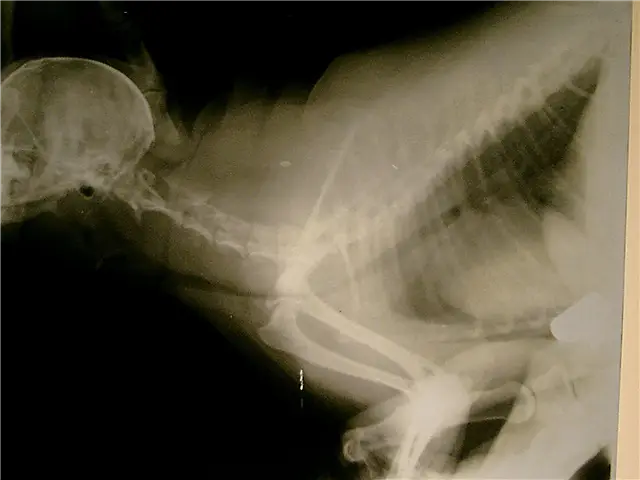- Author Rachel Wainwright wainwright@abchealthonline.com.
- Public 2023-12-15 07:39.
- Last modified 2025-11-02 20:14.
Liprazide
Instructions for use:
- 1. Release form and composition
- 2. Indications for use
- 3. Contraindications
- 4. Method of application and dosage
- 5. Side effects
- 6. Special instructions
- 7. Drug interactions
- 8. Analogs
- 9. Terms and conditions of storage
- 10. Terms of dispensing from pharmacies
Liprazide is a combined antihypertensive drug.
Release form and composition
Dosage form - tablets (10 pcs. In a blister strip, in a cardboard box 1 or 3 packs).
Active ingredients in 1 tablet:
- Lisinopril dihydrate (based on lisinopril) - 10 or 20 mg;
- Hydrochlorothiazide 12.5 mg
Indications for use
Liprazide is used to treat various forms of arterial hypertension (as a monopreparation or as part of a combination therapy).
Contraindications
Absolute:
- Age under 18;
- Pregnancy;
- Lactation;
- Simultaneous use of lithium preparations;
- Idiopathic or hereditary Quincke's edema or Quincke's edema caused by the use of angiotensin-converting enzyme inhibitors (in history);
- Severe renal dysfunction (creatinine clearance less than 30 ml / min), anuria, bilateral stenosis of the renal arteries or stenosis of the artery of a single kidney, as well as the period of hemodialysis using high-strength membranes (polyacrylonitrile, methylsulfonate);
- Hypersensitivity to the components of Liprazide or sulfonamide derivatives.
Relative (special care should be taken due to the risk of complications):
- Mitral and / or aortic stenosis;
- Cardiac ischemia;
- Cerebrovascular disorders;
- Impaired renal / liver function;
- Alcoholism;
- Conditions accompanied by an increase in the level of potassium in the blood;
- The period before surgery with the use of general anesthesia;
- Obstructive hypertrophic cardiomyopathy;
- Severe heart failure;
- Diabetes;
- Violations of water and electrolyte balance;
- Renal artery stenosis;
- Hypovolemia;
- Collagenoses;
- Elderly age;
- Low sodium diet.
Caution should be observed when prescribing the drug to patients on hemodialysis.
Method of administration and dosage
Liprazide is taken orally, swallowing the tablets whole with a sufficient amount of liquid, regardless of meals, but preferably at the same time of day. If necessary, the tablet can be divided into parts.
Doses and duration of drug treatment are determined by the doctor individually for each patient. Usually prescribed at 5-10 mg 1 time / day. If, after 1-2 weeks of taking Liprazide, the therapeutic effect is insufficient, the dose is gradually increased. The recommended maintenance dose is 20 mg once a day.
The maximum allowable daily dose for patients with normal renal function is 80 mg.
The initial dose for patients with impaired renal function (creatinine clearance more than 30 ml / minute) and patients with renovascular arterial hypertension is 2.5 mg 1 time per day.
Before prescribing Liprazide, the doctor must provide the patient with complete information about the symptoms of angioedema.
Side effects
- Gastrointestinal tract and liver: dryness of the oral mucosa, pain in the epigastric region, indigestion, loss of appetite, nausea, vomiting, stool disorder; in isolated cases - changes in taste, jaundice, pancreatitis, hepatitis;
- Central and peripheral nervous system: increased fatigue, headache, disturbed sleep / wakefulness, dizziness, emotional lability, increased irritability, weakness, paresthesia, convulsions; in isolated cases - asthenic syndrome, confusion;
- Cardiovascular system and hematopoietic system: heart rhythm disturbances, thrombocytopenia, feeling of pain and pressure in the chest, excessive decrease in blood pressure, incl. orthostatic hypotension, neutropenia, anemia, agranulocytosis, leukopenia;
- Urinary system: anuria, uremia, impaired renal function, acute renal failure;
- Laboratory indicators: eosinophilia, an increase in the erythrocyte sedimentation rate, leukocytosis, a change in the level of potassium in the blood, a decrease in glucose tolerance, an increase in the activity of liver enzymes, a decrease in the level of chlorine, magnesium and sodium in the blood, an increase in the level of creatinine, calcium, bilirubin, glycerides, urea, cholesterol;
- Allergic reactions: alopecia, urticaria, photosensitivity, itching, skin rash, bronchospasm, Quincke's edema;
- Others: violation of the respiratory rhythm, cough, excessive sweating, pain in muscles and joints, decreased potency; with long-term treatment - gout.
special instructions
Before starting treatment, women of childbearing age are advised to exclude pregnancy.
If it is necessary to use Liprazide during lactation, you should consult your doctor and decide on the interruption of breastfeeding.
During the period of drug therapy, care should be taken when driving vehicles and performing potentially dangerous types of work.
Drug interactions
Possible interaction reactions if Liprazide is used simultaneously with other drugs:
- Hypoglycemic drugs: reducing their therapeutic effects;
- Cyclosporine, sodium chloride solution, potassium-sparing diuretics and potassium preparations, non-steroidal anti-inflammatory drugs, estrogens: decrease in the effectiveness of Liprazide (potassium preparations, potassium-sparing diuretics, indomethacin and cyclosporin also increase the risk of hyperkalemia);
- Thiazide and loop diuretics: increased antihypertensive effect of the drug;
- Tetracyclines, antacids, enterosorbents, cholestipol, cholestyramine: reduced absorption of Liprazide active substances;
- Digoxin: increasing its toxicity;
- Lithium preparations, amantadine: slowing down their excretion;
- Tubocurarine: enhancing its action;
- Methyldopa: risk of developing intravascular hemolysis;
- Barbiturates, ethyl alcohol, narcotic drugs: risk of hypokalemia and orthostatic hypotension;
- Cardiac glycosides: risk of hypokalemia;
- Amiodarone: the likelihood of developing arrhythmias;
- Allopurinol, procainamide, systemic glucocorticosteroids, cytostatics, immunosuppressive drugs: risk of developing leukopenia;
- Non-depolarizing muscle relaxants: enhancing their effects.
Analogs
Liprazide analogs are: Iruzid, Co-Diroton, Lisinopril, Lisopress, Lizoretic, Lizothiazide, Loopril Bosnal.
Terms and conditions of storage
Store at a temperature of 15-25 ° C in a dry place, away from direct sunlight.
The shelf life is 3 years.
Terms of dispensing from pharmacies
Dispensed by prescription.
Information about the drug is generalized, provided for informational purposes only and does not replace the official instructions. Self-medication is hazardous to health!






